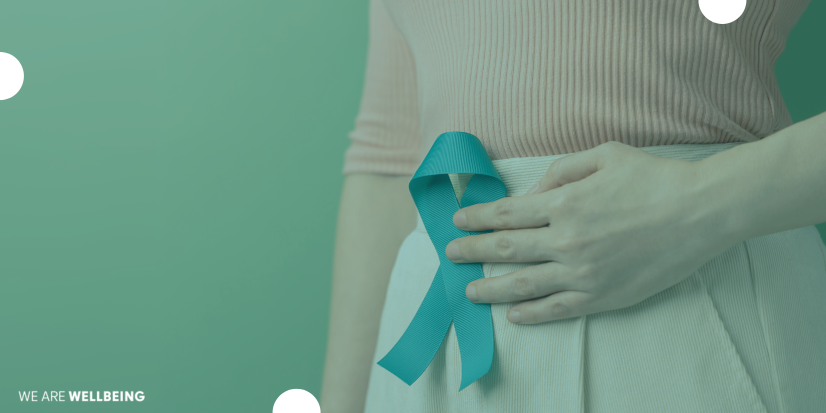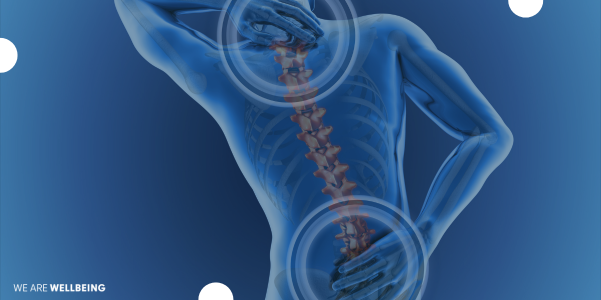This year Cervical Cancer Prevention Week runs from the 22nd – 28th January, and we are proud to be supporting this at We Are Wellbeing. The campaign aims to raise awareness, support those who have been affected, and ultimately, make cervical cancer a thing of the past. Each week in the UK, 9 women will receive a diagnosis of cervical cancer, and sadly, 2 women will lose their lives. This is something we would all like to see change.
In this blog, we will look at what cervical cancer is, how you can reduce your risk, and what are some of the warning signs to look out for.
What is cervical cancer?
It’s something that we’ve all heard of, but do you really know what it is? The cervix is part of the reproductive system, and joins the top of the vagina, to the womb. Anyone with a cervix can get cervical cancer, but it mainly affects those under 45 years old. Nearly all cases (over 99%) are caused by a type of the common virus, human papillomavirus (HPV). But don’t worry, most people will get HPV at some point in their lives, this doesn’t mean everyone is at risk of cancer. It is high risk HPV which can cause changes to the cells in your cervix over many years, and this can develop into cervical cancer.
What signs should I look out for?
It is important to remember that cervical cancer does not always cause symptoms, but below are some things you should look out for.
-
- Any vaginal bleeding which is unusual for you. This could be after sex, between periods or post-menopause.
-
- Changes to the colour, smell and texture of vaginal discharge.
-
- Pain or discomfort during sex.
-
- Unexplained and persistent pain in your lower back, lower tummy or pelvic area.
There are many other reasons why you could be experiencing the above, but it’s always best to get these things checked out by your GP.
How can I reduce my risk?
Positively, 99.8% of cervical cancer cases in the UK are preventable, and there are certain things we can all do to reduce our risk.
Attending your routine cervical screening appointments (also known as a ‘smear test’) is one of the best prevention tools. A small sample of cells are taken from your cervix and checked. Depending on where you are in the UK, screening is offered to women aged between 25-64, every 3-5 years. The screening is very quick and pain free, but we understand that it can feel scary, and have shared a link to Jo’s Cervical Cancer Trust at the end, who offer some fantastic support.
Since 2008, all children aged 12-13 have been offered a HPV vaccine and NHS England have pledged to eliminate cervical cancer by 2040. This vaccine isn’t available to everyone, but if you have any questions, you should ask your GP.
Current smokers are at higher risk of cervical cancer, and stopping can reduce this risk. This is because smokers are more likely to have HPV, it weakens the immune system and can make it more difficult for your body to get rid of HPV, and can cause progression in HPV infected cells.
Where can I get support?
Any health concerns can affect us emotional and mentally, as well as physically, so it’s important to reach out for support when needed. If you do have concerns about cervical cancer, or want to book a screening, you can contact your GP surgery. You may also have friends, family members or colleagues who you can reach out to for support, sometimes just talking can really help.
Below are some great resources:
Jo’s Cervical Cancer Trust (https://www.jostrust.org.uk/) is the UK’s leading cervical cancer charity. They offer information, support, events and helplines. Their website also has some downloadable resources for your workplace.
You can find more information on the NHS website (https://www.nhs.uk/conditions/cervical-cancer/) about screening and treatments available for cervical cancer.
Conclusion
Conversations around cancer can be difficult, but the more we raise awareness and talk about it, the better, and Cervical Cancer Prevention Week provides a fantastic opportunity to do this. Hopefully now you feel more informed about some of the signs to look for, and how you can reduce your risk. If you haven’t attended a recent cervical screening appointment, booking yourself in is a good place to start.
Women’s Health is an important topic, and at We Are Wellbeing we offer a dedicated webinar which focuses on the health conditions which affect women, menopause and more.
For more information contact us on hello@wearewellbeing.co.uk







